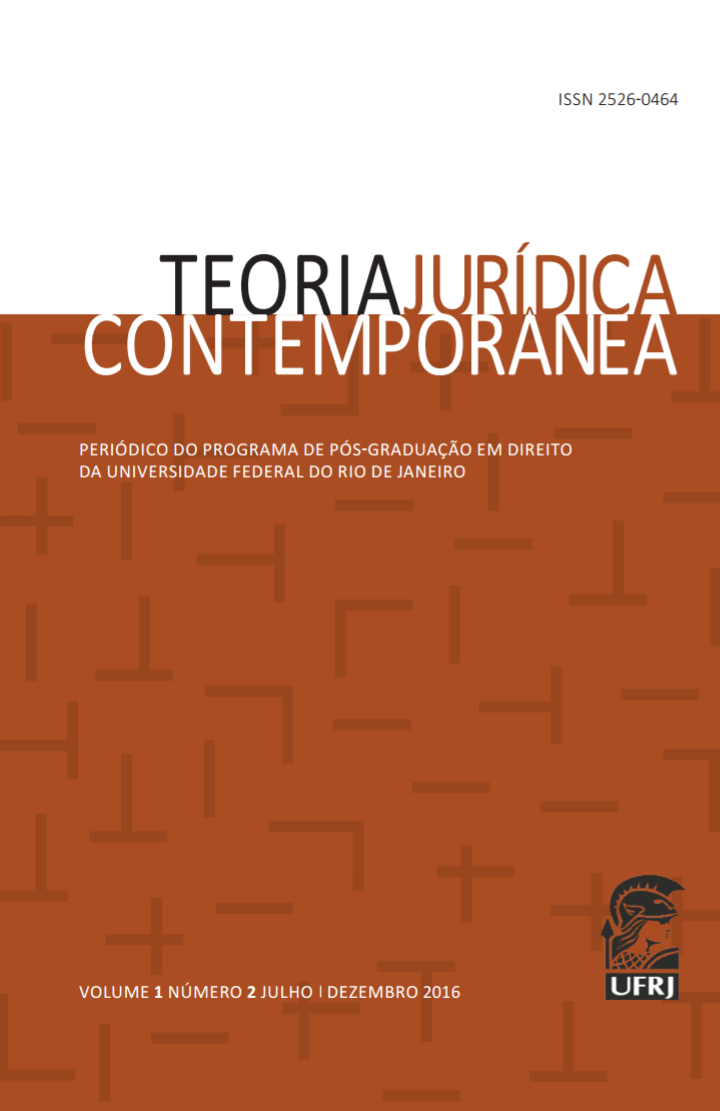Eficácia da suspensão da segurança no tratamento da repetitividade recursal - o caso fosfoetanolamina
DOI:
https://doi.org/10.21875/tjc.v1i2.8709Palavras-chave:
Suspensão da Segurança, Litigiosidade repetitiva, Repetitividade Recursal, Pesquisa empírica, Fosfoetanolamina, Suspension of Security, Repetitive Litigation, Recursal Repetitiveness, PhosphoethanolamineResumo
RESUMO:
A Suspensão da Segurança é um incidente processual de titularidade do Poder Público que visa à suspensão (i) da ordem de segurança concedida em mandados de segurança, ou de (ii) antecipações de tutela e liminares concedidas em ações de obrigação de fazer, bem como em (iii) cautelares em que figure como parte o Poder Público. Ao longo do presente artigo será estudado se há eficácia na utilização desse instrumento processual para o tratamento da litigância repetitiva. A modalidade de estudo de caso foi escolhida como metodologia de pesquisa. O caso foi estudado à luz dos acórdãos que versavam sobre o uso da fosfoetanolamina e a obrigatoriedade de o Poder Público fornecê-la à população. Para tanto, realizou-se uma abordagem qualitativa e quantitativa. O resultado foi que o direito material foi muito mais marcante na fundamentação dos acórdãos do que o julgamento da Suspensão da Segurança, apesar de ter havido certa adstrição à decisão do Órgão Especial do TJSP que julgou definitivamente o pedido de Suspensão da Segurança.
ABSTRACT:
The Suspension of Security is a procedural incident that may be presented by the Public Authorities and that aims at suspending the (i) security order granted in writs, (ii) preliminary rulings granted in actions of obligation to do, as well as in (iii) precautionary measures that the Public Power appear as a part of the process. Throughout the present article it will be studied if the use of this procedural instrument is effective for the treatment of repetitive litigation. The modality of case study was chosen as a research methodology. The case was studied in light of the rulings on the use of phosphoethanolamine and the obligation of the Public Power to provide it to the population. For this, a qualitative and quantitative approach was carried out. The study showed that in the grounds of the judgments, the substantive law was discussed much more than the judgement of the Suspension of Security, although there was some adherence with the decision of the Special Body of the São Paulo Estate Court that ruled the request for Suspension of Security.
Downloads
Referências
CONSELHO NACIONAL DE JUSTIÇA: Justiça em números 2015, ano base 2014. Brasília, 2015.
CUNHA, Leonardo José Carneiro da: A Fazenda Pública em juízo. 6. ed. São Paulo: Dialética, 2008.
GALANTER, Marc: Why the haves come out ahead: speculations on the limits of legal change. In Law and Society. Aldershot: R. Cotterell, 1994.
MARTINS, Urá Lobato: A judicialização das políticas públicas e o direito subjetivo individual à saúde, à luz da teoria distributiva de John Rawls. Revista Brasileira de Políticas Públicas, v. 5, Brasília, 2015.
MOREIRA ALVES, José Carlos: Direito Romano, 14a Ed. Rio de Janeiro: Forense, 2010.
PRETZEL, Bruna Romano: O interesse público no Supremo Tribunal Federal: legitimidade e governabilidade na suspensão de decisões judiciais. 2014, 133 p., Dissertação (Mestrado em Direito), Faculdade de Direito, Universidade de São Paulo, São Paulo, 2014.
ROCHA, Caio Cesar: Pedido de suspensão de decisões contra o poder público. São Paulo: Saraiva, 2012.
RODRIGUES, Marcelo Abelha: Suspensão da Segurança sustação da eficácia de decisão judicial proferida contra o Poder Público. São Paulo: Revista dos Tribunais, 2010.
TALAMINI, Eduardo: Nota sobre a atual natureza jurídica da suspensão de decisões contrárias ao "Poder Público”, à luz do seu regime e eficácia Revista dialética de Direito Processual, v. 67, São Paulo, Mars, 2008.
TESSLER, Marga Barth: Suspensão da Segurança. Revista do TRF4, ano 15, n. 54, Porto Alegre, O Tribunal, 2004.
TOVAR, Leonardo Zehuri: O pedido de suspensão da segurança: uma sucinta sistematização. Revista de Processo, ano 38, n. 224, São Paulo, Revista dos Tribunais, 2013.
Downloads
Publicado
Edição
Seção
Licença
Os autores que publicam nesta revista concordam com os seguintes termos:
- Os autores mantêm os direitos autorais e concedem à revista o direito de primeira publicação, com o trabalho simultaneamente licenciado sob a Licença Creative Commons Attribution que permite o compartilhamento do trabalho com reconhecimento da autoria e publicação inicial nesta revista.
- Os autores têm autorização para assumir contratos adicionais separadamente, para distribuição não-exclusiva da versão do trabalho publicada nesta revista (ex.: publicar em repositório institucional ou como capítulo de livro), com reconhecimento de autoria e publicação inicial nesta revista.
- Os autores têm permissão e são estimulados a publicar e distribuir seu trabalho online (ex.: em repositórios institucionais ou na sua página pessoal) a qualquer ponto antes ou durante o processo editorial, já que isso pode gerar alterações produtivas, bem como aumentar o impacto e a citação do trabalho publicado (Veja O Efeito do Acesso Livre).
Este obra está licenciado com uma Licença Creative Commons Atribuição-CompartilhaIgual 3.0 Brasil.


